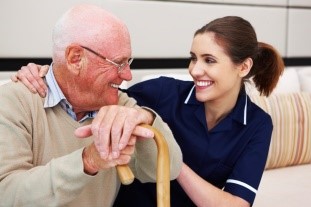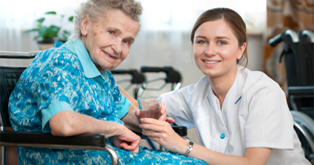Additional Services
High quality, professional nursing care in hospital wards and community settings
We have a strong client base, working together with the NHS in community settings with local authorities and CCGs. We also work with local authorities to provide domiciliary care services and provide care and support services to private individuals in the local community. Additionally, we provide services for hospices, care homes and other care establishments.
Bridges Healthcare offers a unique service that provides highly skilled nurses, healthcare assistants, co-ordinators, care managers, and therapists that can be placed in community settings. This additional service which started in 2012 supports the NHS, local authorities, and CCGs in avoiding delays in discharge, as individuals can be offered a step-down facility where they continue their rehabilitation.
Community settings

In January 2018, Bridges Healthcare was commissioned jointly by Greenwich and Bexley CCGs and their respective local authorities, to set up, manage, and staff a step down unit at Duncan House in Thamesmead. The unit was leased by Bridges Healthcare who also held the registration of the service. Duncan House offered a much calmer environment than a hospital setting, allowing medically fit patients that had received acute treatment in hospital to recuperate before being assessed by their social worker and other professionals as to their proposed discharge destination. Our patients were continuously supported and encouraged to improve by our nursing and care team, and therapists, so that they could meet or exceed their goals.
Success stories

Here are just a few of the many patient success stories which demonstrate why Bridges Healthcare’s service is unique and exceeds an extremely high standard of care.
DK (91 years old)
DK was admitted to hospital with a fall, and previously had a three times a day single-handed package of care. DK’s family now wished for her to have a residential dementia placement. Whilst at Duncan House DK received regular physiotherapy input and her mobility gradually improved, resulting in DK being able to use a walker with the assistance of one. Staff at Duncan House worked together with DK’s family and gradually her overall health improved. As a result DK’s family reviewed their decision for a placement and DK returned to her own home with a four times per day single-handed package of care.
JL (65 years old)
JL was unable to be discharged home from hospital as his housing conditions were poor and a number of repairs were required. JL was a left leg amputee, was known to the mental health team and was obese. JL was admitted to Duncan House whilst waiting for his housing issues to be remedied. The expected outcome was for JL to have a once a day single-handed package of care. Whilst at Duncan House JL’s confidence increased and his mental wellbeing significantly improved. When the time came for JL to return home he was fully independent and no package of care was required.
EW (95 years old)
EW was admitted into hospital after a fall. EW had a history of falls, as well as osteoarthritis, atrial fibrillation and dementia. Her expected outcome at discharge was conventional nursing. During her stay at Duncan House EW’s health significantly improved, as did her mobility, to the extent that it was considered that the discharge plan was revised for EW and that extra care accommodation would be the most suitable option.
GN (57 years old)
GN was admitted to hospital with a fractured hip. GN had been nursed in the community for many years and was known to the District Nursing team. He also had a history of falls and self-neglect, as well as acquired pressure sores whilst being cared for in the community.
GN’s expected outcome upon discharge was for a nursing home placement. On admission to Duncan House, GN was referred to the dietician and was given nutritional supplements in order to improve his diet. Whilst at Duncan House GN had both physiotherapy and occupational therapy input and his mobility began to improve to such an extent that he was able to use two sticks to mobilise. This allowed GN to be referred to a specialist physio unit for more intense rehab. Also during his stay his pressure sores began to heal and there was a marked improvement. In addition, his mental and dietary wellbeing improved.






